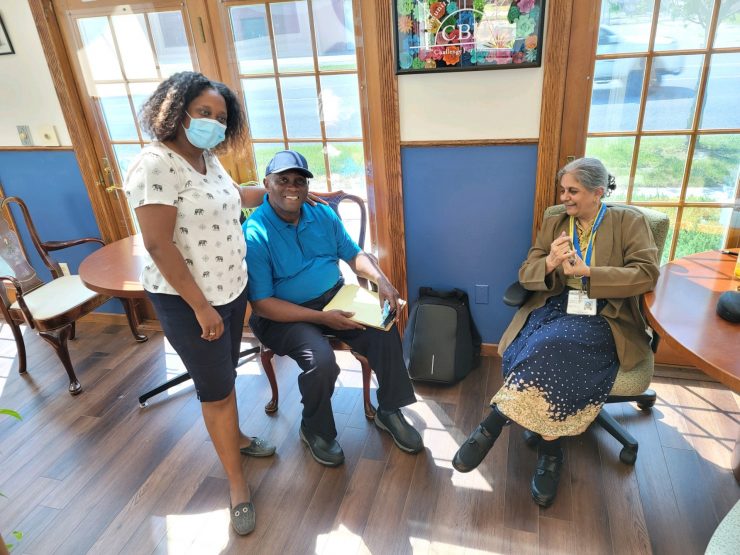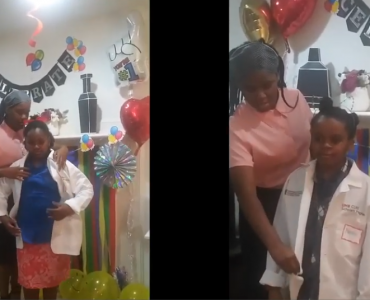University of Maryland, Baltimore (UMB) employees and students have canvassed neighborhoods to make COVID-19 vaccine appointments for the most vulnerable. They’ve held vaccination clinics for families at community schools. They’ve served on panels and answered hotline calls to combat misinformation about the vaccines. And now as part of UMB’s continued outreach to increase vaccination rates, community health experts are partnering with key community and faith-based groups to reach the most vulnerable and underserved communities.
Community outreach experts in the Department of Family and Community Medicine (DFCM) and the Department of Psychiatry at the University of Maryland School of Medicine (UMSOM) are working with groups in Baltimore, including the AME Zion Church and the NAACP’s local branch as part of the Community-Based Workforce for COVID-19 Vaccine Outreach Program.
The program will support families with children ages 12 to 15, including those with special behavioral health needs, by addressing barriers to vaccines. It also will provide culturally relevant information, practical support, and one-on-one conversations with trusted community partners about vaccine concerns.
The multistate program, which extends across Maryland, Delaware, Virginia, and West Virginia, is funded by a $7.8 million award from the U.S. Health Resources and Services Administration (HRSA). It builds upon community work already underway by UMSOM that is funded by the Maryland Community Health Resources Commission and aims to reach individuals in vulnerable communities at the grassroots level across the state.
“It is critical to understand that the objections and concerns about getting vaccinated are real and valid in these communities in order to address them,” said Niharika Khanna, MBBS, MD, DGO, professor, DFCM, section chief of population health in the department, and co-principal investigator (PI) for the program. “We must acknowledge them and tailor our conversations accordingly.”
Language and cultural barriers are being addressed by cultural ambassadors and community leadership engagement. Multiple methods of communication are planned, including face to face, virtual, print, live, radio, television, social media, and billboards. UMSOM’s partners are going into communities that are difficult to reach using a public health messaging truck. Others are reaching the homeless population with street-based outreach and engaging post-penitentiary populations through behavioral health providers.
“The regions of the four states that have high rates of vaccine hesitancy are in a variety of settings, including rural and urban communities,” said co-PI Gloria M. Reeves, MD, associate professor, Department of Psychiatry. “Our outreach plans were developed to address specific geographic challenges such as poor internet access, utilize community strengths like coordination with local schools and faith-based organizations, and provide testimonials from community representatives on how they approached vaccine decision-making.”
Partnering with Key UMB Programs and Community Leaders
The program incorporates key partners already trusted in these communities, such as several Area Health Education Centers (AHEC), including UMB’s Community Engagement Center (CEC). In addition to the AME Zion Church and NAACP, other community partners central to this program include Community Behavioral Health, National Federation of Families, and Family Voices. UMSOM’s partnerships with these community leaders will help to identify those with vaccine hesitancy in a wider swath of the population across the four states. These partnerships will be used to develop a family, community, and faith-based approach toward enhanced outreach in these communities.
Experts maintain that this is not a one-size-fits-all program. Based on information collected from community leaders and members of each population, the program will be tailored to meet the specific religious, ethnic, and socioeconomic needs of each community.
“Through this HRSA-funded collaboration with UMB and other partners, we will be able to help our communities overcome vaccine hesitancy by initiating conversations about the very real and certain consequences of COVID-19, including hospitalization, long-term disability, and death,” said Rev. Kobi Little of the Baltimore NAACP.
“The vaccines are our best shot at staying safe,” Little added. “By engaging in frank and honest conversations with friends, family, and neighbors at the grassroots level, we hope to activate communities to lead efforts to protect our people and get everyone vaccinated.”
The goal in Baltimore is to address social barriers to COVID-19 vaccines and develop strategies and infrastructure to address vaccine hesitancy in Baltimore ZIP codes that have neighborhoods where roughly 70 percent of the population has not been vaccinated. DFCM is partnering with the SEED School in Baltimore to provide vaccination, education, and outreach to parents, students, and school staff. The central AHEC will provide navigation and post-vaccine care packages.
A key component of the program involves hiring and mobilizing community outreach workers and family peer specialists, who will serve as trusted messengers to support families in one-on-one relationships. It will also include community health workers, social support specialists, and others to increase vaccine access for the hardest-hit and highest-risk communities through on-the-ground outreach to educate and assist individuals in getting the information they need about vaccinations.
Across-UMB Effort
The work has extended beyond UMSOM. Deanna Tran, PharmD, BCACP, an associate professor in the Department of Pharmacy Practice and Science at the University of Maryland School of Pharmacy (UMSOP), is the only pharmacist on the Maryland Community Health Resources Commission and the HRSA grants and serves primarily as a clinical expert for patients and community outreach workers. She has been a guest speaker at community events to answer questions about the COVID-19 vaccines, trained community outreach workers on how to combat misinformation, and helped community organizations find pharmacies that are providing the vaccines.
Tran has staffed the COVID-19 information hotline to help answer questions, clarify misinformation, and provide information about where to get the vaccine.
She also hosted UMSOP’s annual Francis S. Balassone Memorial Lecture, which featured two community members from West Baltimore sharing their experiences about COVID-19 vaccine hesitancy.
At the University of Maryland School of Social Work (UMSSW), the NextGen program, which supports students in meeting their college and career goals and helps them become better citizens through social justice and advocacy, is working with Open Society Institute on vaccine advocacy by providing educational sessions for teenagers.
This work builds on UMB’s vaccine outreach earlier this year.
UMSSW’s Positive Schools Center held two vaccination clinics at one of its community schools and helped families find vaccine appointments.
In early April, when the M&T Bank Stadium Mass Vaccination Site in Baltimore peaked at 6,000 vaccinations a day, four University of Maryland School of Nursing students, as part of their community/public health clinical rotation, canvassed in neighboring West Baltimore to schedule vaccine appointments for community members. The students worked with members of the CEC to schedule appointments at nearby vaccination sites, including the one at UMB’s SMC Campus Center.
This allowed community members to have one-on-one interactions with health care professionals to learn more about the vaccine.
“There’s no better way to reach people than contact with a living and breathing human,” says Nneka Mitchell, RN, an RN-to-Master of Science in Nursing student. “They know that we’re part of the University community, so they know that we’re giving them good information, and that establishes trust.”
The participating UMSON students and the CEC team scheduled more than 170 vaccination appointments from March to June. The CEC team expanded these efforts by collaborating with “The Family COVID-19 Vaccine Outreach Project: A National Intervention to Support Special Needs Youth and Their Families” at UMSOM to hire and train community outreach workers to build relationships with neighbors and have vaccine conversations aimed at reducing barriers to obtaining the COVID-19 vaccine.
Once the Centers for Disease Control and Prevention approved the COVID-19 vaccine for children 12 and older in May, Amy Hoffer, DNP ’21, CPNP-PC, clinical instructor, said it was important for health care providers to talk to parents and guardians of pediatric patients about the vaccine.
“We’re finding that parents who get their questions answered from a knowledgeable source are much more likely to be comfortable with vaccinating their children,” she said.
Jen Badie, managing editor, and Jena Frick, senior media relations specialist, both in the Office of Communications and Public Affairs at the University of Maryland, Baltimore, and Laura Hager, editorial and public/media relations specialist at the University of Maryland School of Nursing, contributed to this article.




